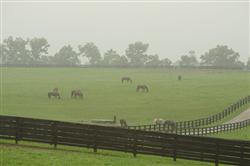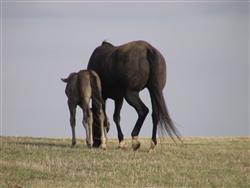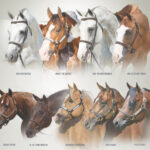Quick Links
Menu

Mare Breeding and Health Management
To complete the management of our broodmare band, DeGraff Stables recognizes that a comprehensive vaccination, deworming, dental and farrier program must be maintained.  This augments our exercise and nutritional program to maintain reproduction excellence in our mares and superiority in foal health. Our farm manager, Melanie Taylor, works closely with our practicing veterinarian partners to maintain overall herd health.
Mares are vaccinated annually according to the AAEP recommended guidelines approximately 4-5 weeks prior to foaling for their own protection, as well as to maximize concentrations of immunoglobulins in their colostrum to be passively transferred to their foals DeGraff Stables adminsters the core vaccines; Tetanus, EEE/WEE, WNV and Rabies. In addition, other risk-based vaccines such as Botulism, EHV, EVA, Equine Influenza, Potomac Horse Fever, Rotaviral Diarrhea and Strangles are given. For complete Vaccination Guidelines, Principles of Vaccination, Infectious Disease Control and other information visit the AAEP website
This augments our exercise and nutritional program to maintain reproduction excellence in our mares and superiority in foal health. Our farm manager, Melanie Taylor, works closely with our practicing veterinarian partners to maintain overall herd health.
Mares are vaccinated annually according to the AAEP recommended guidelines approximately 4-5 weeks prior to foaling for their own protection, as well as to maximize concentrations of immunoglobulins in their colostrum to be passively transferred to their foals DeGraff Stables adminsters the core vaccines; Tetanus, EEE/WEE, WNV and Rabies. In addition, other risk-based vaccines such as Botulism, EHV, EVA, Equine Influenza, Potomac Horse Fever, Rotaviral Diarrhea and Strangles are given. For complete Vaccination Guidelines, Principles of Vaccination, Infectious Disease Control and other information visit the AAEP website
 This augments our exercise and nutritional program to maintain reproduction excellence in our mares and superiority in foal health. Our farm manager, Melanie Taylor, works closely with our practicing veterinarian partners to maintain overall herd health.
Mares are vaccinated annually according to the AAEP recommended guidelines approximately 4-5 weeks prior to foaling for their own protection, as well as to maximize concentrations of immunoglobulins in their colostrum to be passively transferred to their foals DeGraff Stables adminsters the core vaccines; Tetanus, EEE/WEE, WNV and Rabies. In addition, other risk-based vaccines such as Botulism, EHV, EVA, Equine Influenza, Potomac Horse Fever, Rotaviral Diarrhea and Strangles are given. For complete Vaccination Guidelines, Principles of Vaccination, Infectious Disease Control and other information visit the AAEP website
This augments our exercise and nutritional program to maintain reproduction excellence in our mares and superiority in foal health. Our farm manager, Melanie Taylor, works closely with our practicing veterinarian partners to maintain overall herd health.
Mares are vaccinated annually according to the AAEP recommended guidelines approximately 4-5 weeks prior to foaling for their own protection, as well as to maximize concentrations of immunoglobulins in their colostrum to be passively transferred to their foals DeGraff Stables adminsters the core vaccines; Tetanus, EEE/WEE, WNV and Rabies. In addition, other risk-based vaccines such as Botulism, EHV, EVA, Equine Influenza, Potomac Horse Fever, Rotaviral Diarrhea and Strangles are given. For complete Vaccination Guidelines, Principles of Vaccination, Infectious Disease Control and other information visit the AAEP website
Broodmares are trimmed on a 6-8 week schedule to maintain proper care of their feet. In some instances, as directed by our farrier, mares may be shod to provide comfort. American Farriers Organization
 Our attention to deworming is not limited to a rotation of products every 60 days. While we do subscribe to rotational deworming, in our advanced approach to parasite control, mares and foals are spot checked for fecal counts to determine the efficiency of the deworming products. Paddocks are picked and pastures are harrowed.
To insure dosing is correct, a weight tape is used with each deworming and the weight and dosage being logged into the mare’s computer records
Our attention to deworming is not limited to a rotation of products every 60 days. While we do subscribe to rotational deworming, in our advanced approach to parasite control, mares and foals are spot checked for fecal counts to determine the efficiency of the deworming products. Paddocks are picked and pastures are harrowed.
To insure dosing is correct, a weight tape is used with each deworming and the weight and dosage being logged into the mare’s computer records 

